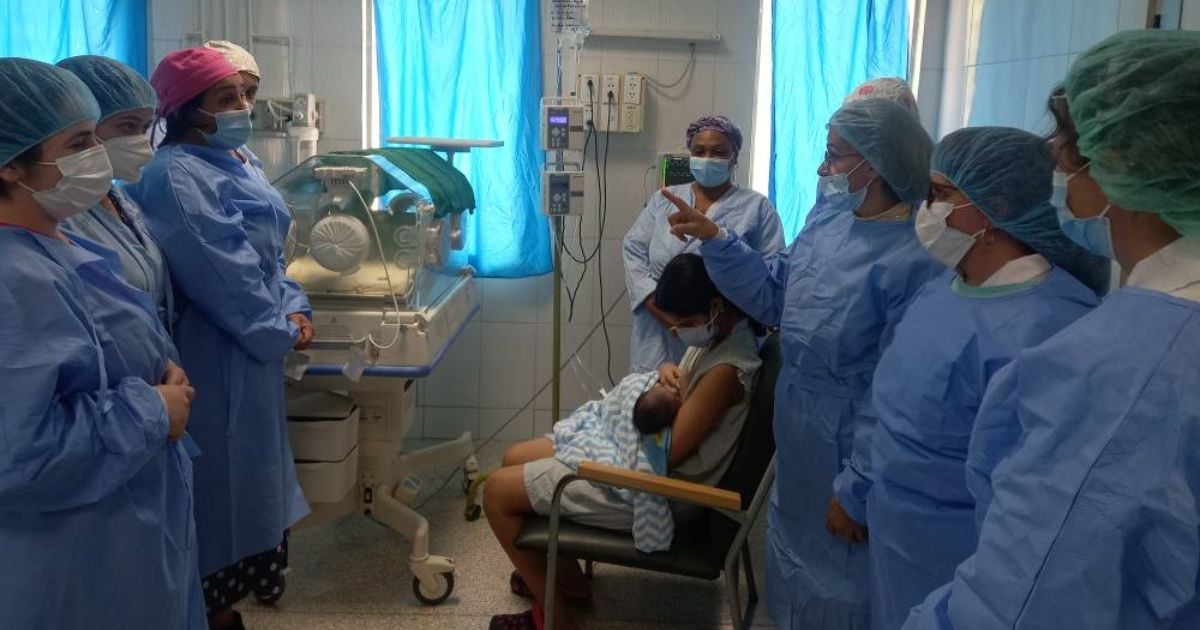At just 31 hours old, *Carlos Manuel Fajardo Hernández*, an infant from Cienfuegos, was urgently transported to José Luis Miranda Pediatric Hospital in Villa Clara. He was diagnosed with esophageal atresia, a congenital defect that disrupts the normal connection between the esophagus and the stomach. Upon arrival in the Neonatal Intensive Care Unit, the medical team swiftly assessed the severity of his condition, as reported by state journalist Oscar Salabarría on Facebook.
The surgery needed to be performed immediately to save his life. A multidisciplinary team led by Dr. *Abel Armenteros García*, head of Pediatric Surgery at the hospital, took on the challenge. The surgeon explained that it was a "major and invasive" operation, not only due to the baby's young age and fragility but also because of the anatomical complexity involved. The esophageal fistula did not connect as it typically should, requiring surgeons to employ uncommon techniques.
"It was a quite complicated case," acknowledged the specialist, mentioning that the esophagus was successfully reconnected to allow for normal function. "It's a surgery where you sweat a lot. Decisions must be made on the spot. It's stressful, but it's a specialty one falls in love with," commented Armenteros, who also leads the regional surgery service for newborns.
Now, more than two weeks after the procedure, Carlitos is feeding orally, showing positive recovery, and is preparing to return home to Cienfuegos. "The child is healthy and recovered; he'll lead a normal life, get vaccinated like others, run, and play baseball like any child," the doctor assured.
Dr. *Isnaida Izquierdo Milián*, a first-degree neonatologist and a key figure in this story, shared that the baby is now 16 days old, 15 days post-surgery. "He has shown a good recovery, and we are close to transferring him back to his province. Seeing the mother happy and the baby demanding food vigorously is the greatest satisfaction for us," she expressed with emotion.
For the parents, *Leannedi* and *Carlos*, the experience has been an emotional rollercoaster, from initial despair to current relief. "When we arrived, he was very ill. They had to operate urgently, and now he's fine. What I feel now is a love that cannot be explained," the father said.
Carlitos' journey is emblematic of many Cuban families who face unexpected medical challenges in a country where material shortages often hinder miraculous recoveries. Amidst the uncertainty, anxiety, and fear that usually accompany diagnoses like esophageal atresia, this young boy has achieved the most crucial feat: clinging to life.
His strong cries, stable recovery, and the warmth of his parents offer a testament to faith, resilience, and love that endures beyond the toughest initial hours.
In the midst of an unprecedented healthcare crisis in Cuba, where hospitals are grappling with a dire shortage of medical supplies, essential medicines, and basic equipment, extraordinary stories of child survival emerge against the odds. In 2024, a newborn underwent surgery just six hours after birth due to a severe congenital defect. The procedure took place at the same facility, José Luis Miranda Pediatric Hospital in Villa Clara, which has managed other complex cases. Despite the challenging conditions, the medical team succeeded in stabilizing the young patient and saving his life.
Another case that drew national attention occurred last January when a child required urgent intervention after inhaling a watch part. Thanks to a delicate surgical maneuver, the child was rescued from a potentially fatal situation. Finally, this past February, doctors in Santiago de Cuba performed an emergency operation to remove a tumor from a young patient. The surgery was described as risky due to the tumor's location and the usual logistical challenges, including suboptimal operating room conditions.
Medical Challenges and Success Stories in Cuba
What is esophageal atresia?
Esophageal atresia is a congenital condition where the esophagus does not connect properly to the stomach, causing difficulties in feeding and digestion.
How did the medical team manage the surgery under difficult conditions?
Despite shortages of medical supplies, the team at José Luis Miranda Pediatric Hospital successfully performed the complex surgery through innovative techniques and quick decision-making.
What are some other recent medical challenges in Cuba?
Recent challenges include a child who inhaled a watch part requiring urgent surgery and a young patient in Santiago de Cuba who underwent a risky tumor removal operation.
